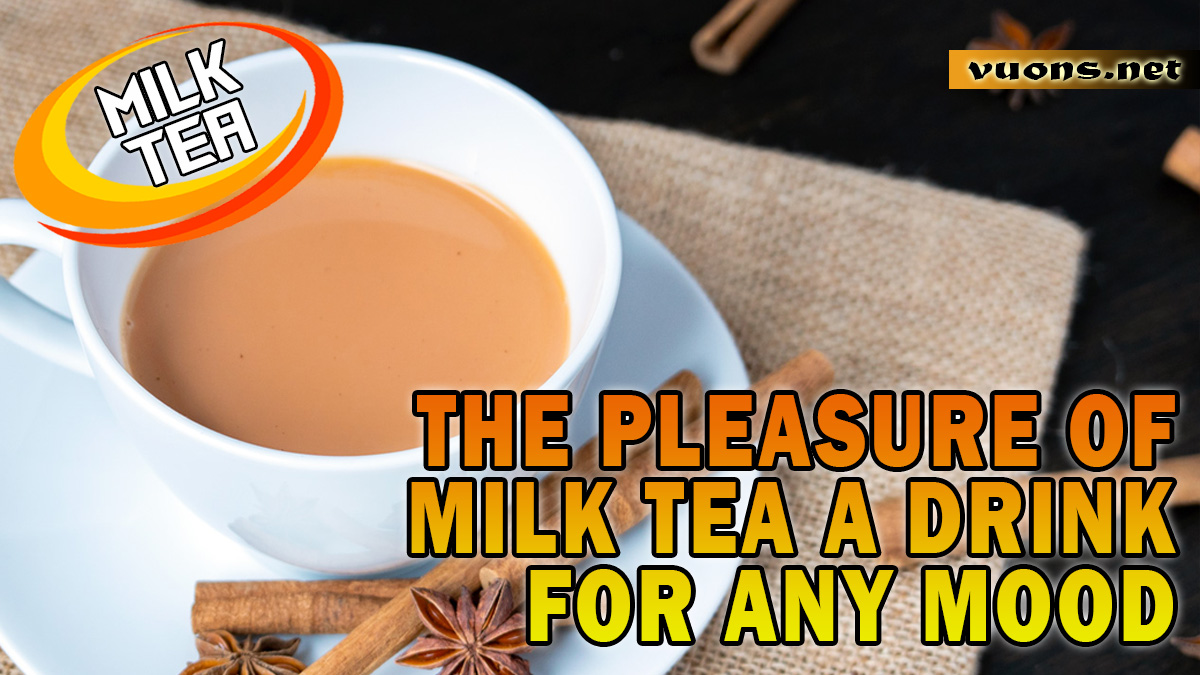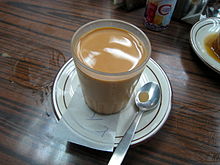Milk Tea: A Delicious Drink Rich in Flavor
History and Origin of Milk Tea
Milk tea is a drink that combines tea and milk to create a rich and delicious taste. This Drink has a long and varied history, originating in various cultures around the world. The history and origins of milk tea can be traced back to Asia and Europe, with each region having its own unique version.
In Asia, particularly in China and Taiwan, milk tea has been an important part of tea drinking culture for centuries. In China, adding milk to tea began as a way to reduce the strong bitterness of black tea. This tradition spread to Tibet, where people developed the famous yak butter tea. In Taiwan, milk tea developed further into the popular drink we know as bubble tea or boba tea, which combines tea, milk, sugar and chewy tapioca balls.
In Europe, the tradition of adding milk to tea can be traced back to England in the 17th century. Milk tea is an integral part of British tea culture, where it is often served with milk and sugar. This practice stems from the practical need to protect delicate porcelain cups from the heat of freshly brewed tea. By adding the milk first, the cup is less likely to crack. Additionally, milk tea helps soften the strong taste of black tea, making it smoother and more enjoyable to drink.
The history and origins of milk tea show how this drink has developed and been adapted by various cultures. From China to England, milk tea has become a symbol of warmth and comfort, creating bonds between peoples through the simple but meaningful ritual of drinking tea. Today, milk tea continues to evolve with many modern variations, making it a timeless and always relevant drink.
Health Benefits of Milk Tea
Milk tea, a combination of tea and milk, is not just a delicious drink, it also has a variety of significant health benefits. Consuming milk tea regularly can have a positive impact on the body, thanks to the nutritional content of tea and milk.
One of the health benefits of milk tea is the antioxidant content of the tea. Tea, especially green tea and black tea, is rich in antioxidants such as flavonoids and catechins which help fight free radicals in the body. These antioxidants play an important role in preventing cell damage, which can reduce the risk of chronic diseases such as cancer and heart disease.
The milk in milk tea adds its own benefits. Milk is rich in calcium, vitamin D, and protein, all of which are important for healthy bones and teeth. Calcium and vitamin D work together to increase bone density, reduce the risk of osteoporosis, and maintain bone strength as we age.
Milk tea can also aid in digestion. Tea contains compounds that can stimulate the production of digestive enzymes, thereby helping the process of digesting food more efficiently. Additionally, milk has a calming effect on the stomach, which can help relieve digestive disorders such as heartburn or gastritis.
Consuming milk tea can also have a relaxing effect and calm the mind. Tea contains L-theanine, an amino acid known to improve focus and provide a calming effect. When mixed with milk, this drink is the perfect combination to relieve stress and anxiety.
The health benefits of milk tea don’t stop there. Milk tea is also known to increase energy and alertness thanks to the caffeine content in tea. Caffeine helps improve concentration and mental alertness, while milk provides the additional energy the body needs.
Various Types of Milk Tea in Different Countries
In England, milk tea is an integral part of tea drinking culture. English Breakfast Tea is often served with a little milk and sugar, creating a rich and creamy drink. English milk tea is usually enjoyed in the afternoon, often accompanied by cakes and sandwiches.
Taiwan is the home of bubble tea, also known as boba tea, which has become a global phenomenon. Bubble tea combines tea, milk, sugar and chewy tapioca balls. Popular variants include milk tea in flavors such as taro, matcha and chocolate. This drink is usually served cold and is a favorite among young people.
In India, chai is a famous type of milk tea. Masala chai, or spiced tea, is a mixture of black tea with milk, sugar, and various spices such as cinnamon, cardamom, ginger, and cloves. This drink has a warm and spicy taste, and is often enjoyed hot in the morning or as a refreshment in the afternoon.
Hong Kong has Hong Kong-style milk tea which is also known as “pantyhose tea” because of the way it is filtered. This tea is a mixture of very strong black tea with evaporated milk or sweetened condensed milk, creating a very smooth and rich drink. Hong Kong-style milk tea is usually served cold or hot and is an important part of the local culinary culture.
Thailand offers Thai iced tea, a milk tea drink that is often served in Thai restaurants around the world. Thai iced tea is made from black tea brewed with anise, then mixed with sweetened condensed milk and evaporated milk. Served cold with ice, this drink has a sweet and creamy taste with a hint of spice.
Milk Tea as Part of a Healthy Lifestyle
Milk tea is not only a delicious drink, but can also be an integral part of a healthy lifestyle. The combination of tea and milk offers various health benefits that make it a good drink choice for daily consumption.
Tea, especially green tea and black tea, contains many antioxidants known as flavonoids. These antioxidants help fight free radicals in the body, which can reduce the risk of chronic diseases such as cancer and heart disease. Apart from that, tea also has anti-inflammatory properties which can help reduce inflammation and maintain heart health.
The milk in milk tea adds significant nutritional value. Milk is rich in calcium, which is important for healthy bones and teeth. Calcium along with vitamin D, which is often found in milk, helps increase bone density and reduces the risk of osteoporosis. The protein in milk is also important for the growth and repair of body tissue.
Additionally, milk tea can aid in digestion. Tea contains tannins that can stimulate the production of digestive enzymes, while milk has calming properties that can help relieve indigestion. This makes milk tea a good choice after meals.
Consuming milk tea can also be an effective way to manage stress and improve focus. Tea contains L-theanine, an amino acid known to promote relaxation and improve concentration without causing drowsiness. When mixed with milk, this calming effect can be more pronounced, making milk tea a suitable drink to drink while working or studying.
With these various benefits, milk tea can be part of a healthy lifestyle. Choosing milk tea as a daily drink can help maintain body health, increase energy and reduce stress. As part of a balanced diet, milk tea offers a unique combination of taste and nutrients that benefits overall health.




